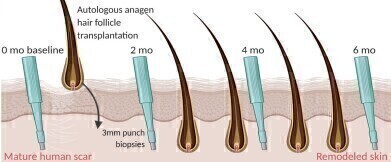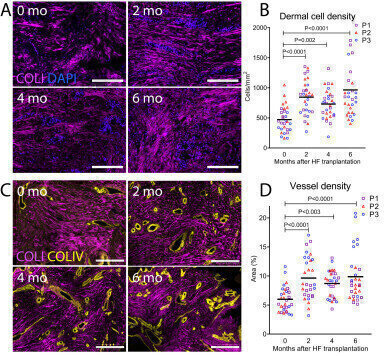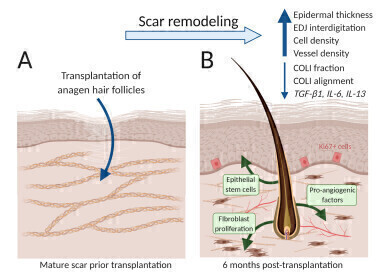-
 Fig 1– Schematic of the experimental outline and hypothesis showing skin biopsies at baseline and then 2, 4 and 6 months after hair transplantation. Image credit: Plotczyk et al., Nature Regenerative Medicine
Fig 1– Schematic of the experimental outline and hypothesis showing skin biopsies at baseline and then 2, 4 and 6 months after hair transplantation. Image credit: Plotczyk et al., Nature Regenerative Medicine -
 Figs 3a & b – Microscope images and graph of skin cell density (blue) at 0, 2, 4 and 6 months post-transplant. Reveals an increase in skin cells over time. Figs 3c & d - Microscope images and graph of blood vessel density (yellow) at 0, 2, 4 and 6 months post-transplant. Reveals an increase in blood vessels over time. Plotczyk et al., Nature Regenerative Medicine
Figs 3a & b – Microscope images and graph of skin cell density (blue) at 0, 2, 4 and 6 months post-transplant. Reveals an increase in skin cells over time. Figs 3c & d - Microscope images and graph of blood vessel density (yellow) at 0, 2, 4 and 6 months post-transplant. Reveals an increase in blood vessels over time. Plotczyk et al., Nature Regenerative Medicine -
 Fig 6 – Schematic of results showing how the transplants promoted scar rejuvenation. The treated scarred skin harboured new cells and blood vessels, remodelled collagen to restore healthy patterns and expressed genes found in healthy unscarred skin Plotczyk et al., Nature Regenerative Medicine
Fig 6 – Schematic of results showing how the transplants promoted scar rejuvenation. The treated scarred skin harboured new cells and blood vessels, remodelled collagen to restore healthy patterns and expressed genes found in healthy unscarred skin Plotczyk et al., Nature Regenerative Medicine
News
Transplanted Hair offers hope for Skin Rejuvenation
Jan 13 2023
In a new study Imperial researchers (ICL) discovered that hair follicle transplants on scarred tissue can help promote scar rejuvenation by altering their architecture and genetic makeup, promoting growth in new cells, blood vessels and collagen to restore healthy skin patterns.
Lead author Dr Claire Higgins, of Imperial’s Department of Bioengineering, said: “After scarring, the skin never truly regains its pre-wound functions and until now all efforts to remodel scars have yielded poor results. Our findings lay the foundation for exciting new therapies that can rejuvenate even mature scars and restore the function of healthy skin.”
The team worked with Dr Francisco Jiménez, lead hair transplant surgeon at the Mediteknia Clinic and Associate Research Professor at University Fernando Pessoa Canarias, in Gran Canaria, Spain. They transplanted hair follicles into mature normotrophic scars, which usually form after surgery, onto the scalp of three participants in 2017.
Using 3mm-thick biopsies following the transplants, the epidermis (outer skin layer) was found to have doubled in thickness alongside increased cell growth after six months, bringing it to around the same thickness as uninjured skin. In the dermis, the next skin layer down, reduced cell populations of connective tissue, blood vessels, sweat glands, nerves and hair follicles, had also doubled at six months, while the number of vessels had reached nearly healthy-skin levels by four months. The scars also expressed 719 genes differently to before, with genes that promote cell and blood vessel growth forming a majority.
The team is now investigating the underlying processes discovered in the research, with aims to develop therapies that remodel scar tissue towards healthy skin, without requiring transplantation of a hair follicle and growth of a hair fibre. They can then test their findings on non-hairy skin, or on organs like the heart, which can suffer scarring after heart attacks, and the liver, which can suffer scarring through fatty liver disease and cirrhosis.
Dr Jiménez said: “Around 100 million people per year acquire scars in high-income countries alone, primarily as a result of surgeries. The global incidence of scars is much higher and includes extensive scarring formed after burn and traumatic injuries. Our work opens new avenues for treating scars and could even change our approach to preventing them.”
This work was funded by the Medical Research Council and Engineering and Physical Sciences Research Council (part of UKRI).
More information online
Digital Edition
Lab Asia Dec 2025
December 2025
Chromatography Articles- Cutting-edge sample preparation tools help laboratories to stay ahead of the curveMass Spectrometry & Spectroscopy Articles- Unlocking the complexity of metabolomics: Pushi...
View all digital editions
Events
Jan 21 2026 Tokyo, Japan
Jan 28 2026 Tokyo, Japan
Jan 29 2026 New Delhi, India
Feb 07 2026 Boston, MA, USA
Asia Pharma Expo/Asia Lab Expo
Feb 12 2026 Dhaka, Bangladesh


















